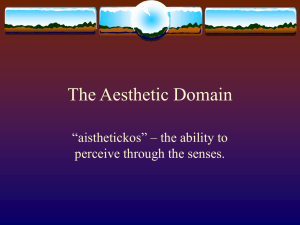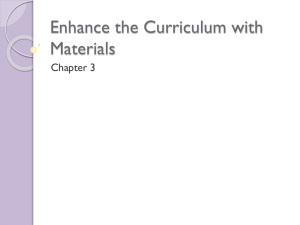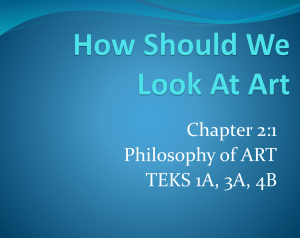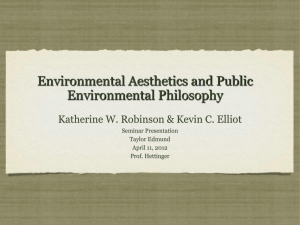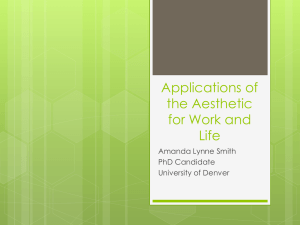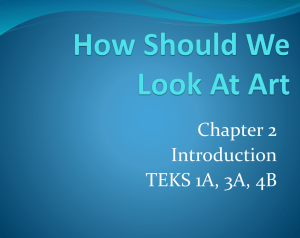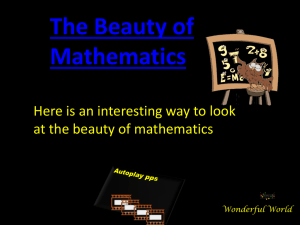Martin Griffiths Presentation
advertisement
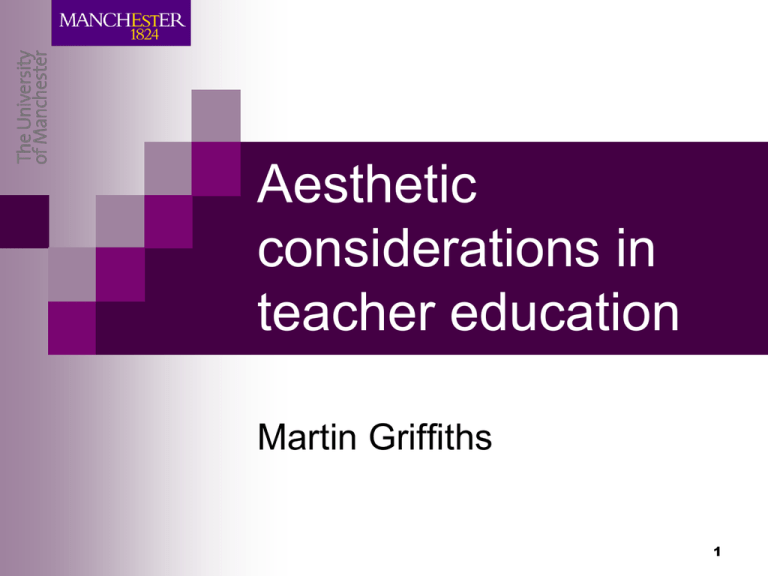
Aesthetic considerations in teacher education Martin Griffiths 1 . In this paper I consider the potential dilemmas faced by teacher educators wishing both to explore and to highlight aesthetic aspects of their subje What are our aims here? First, to explore whether there evidence in our classrooms for the presence of, or appreciation for, the various aesthetic aspects of mathematics? Second, within this context, to consider the potential dilemmas faced by teacher educators wishing both to explore and to highlight aesthetic aspects of their subject areas whilst simultaneously having to satisfy their students’ perceived needs regarding the pragmatic business of modern-day teaching. 2 What do we mean by aesthetics? Yuri Borev gives a very broad definition: “Any human activity has, besides a purely utilitarian purpose, the grains of what makes it universally important for mankind. It is these grains which lend human activity its aesthetic flavour.” 3 What about the mathematical aesthetic? Aesthetics is often considered a branch of axiology. The perspective I adopt is that a student’s aesthetic capacity is not simply their ability to identify formal qualities such as economy, inevitability, and unexpectedness, but also comprises their sensibility in combining information with imagination when making purposeful decisions regarding meaning and pleasure. 4 Beauty in method Beauty in mathematical results Beauty through experience Philosophical aspects to beauty 5 Is the mathematical aesthetic an elitist concept? "The mathematician does not study pure mathematics because it is useful; he studies it because he delights in it and he delights in it because it is beautiful." -- Henri Poincare "Beauty in mathematics is seeing the truth without effort.“ -- George Polya "The mathematician's patterns, like the painter's or poet's, must be beautiful. The ideas, like the colours or the words, must fit together in a harmonious way. Beauty is the first test: There is no permanent place in the world for ugly mathematics.” -- G. H. Hardy "Mathematics, rightly viewed, possesses not only truth, but supreme beauty." -- Bertrand Russell "We cannot hope that many children will learn mathematics unless we find a way to share our enjoyment and show them its beauty as well as its utility." -- Mary Beth Ruskai 6 Some educators who have written on the mathematical aesthetic: N. Sinclair P. Betts J. Dewey A. Mack G. Gadanidis C. Hoogland S. Papert T. Tymoczko 7 Roles purported to be played by the aesthetic: Motivational (intrinsic rather extrinsic) Evaluative Generative 8 Some questions: Is test-score-driven schooling having an effect on mathematics to the extent that motives are transforming from aesthetic considerations to more utilitarian ones? Are we, as a consequence, completely losing sight of aesthetic values in school mathematics? Does it matter? 9 Classroom observations I have seen some excellent lessons, but even many of these do not provide real opportunities for students to experience or explore mathematics in a way that will allow their aesthetic sensibilities to develop and flourish. Complete lack of vocabulary associated with the aesthetic. Discourse centres on things such as “The examiner will be looking for …” or “We are doing this because you will get asked about it in your GCSE”, and so on. A complete absence of any “Aha!” moments amongst the students. 10 Comments At present I am merely highlighting some findings and express concern over what I perceive to be a potential issue. I am not yet offering any solutions! Are we gradually losing sight of the aesthetic aspects of mathematics; will this affect creativity of future generations? Are we becoming ‘mathematical parrots’, capable only of regurgitating the work of others as opposed to being creative ourselves? 11 Is the whole thing dangerously selfperpetuating? Are the curriculum and the accompanying resources (textbooks, for example) partly to blame? If the whole area of the mathematical aesthetic is seen as elitist by some, then how might we counter this? Have we gone beyond the point of no return? 12 Some thoughts on teacher education There are some amazing teachers out there; both trainees and mentors. I see the problem as a systemic one. How may we, as practicing teachers and educators, encourage new entrants to the profession to engage with the aesthetic? 13 Could we incorporate explicitly the notion of the aesthetic as part of our PGCE programmes? Might we encourage this aspects of our subjects in lesson plans, for example? Might the above steps be counter productive in the sense that they would seem to force the issue, and be yet another aspect of the tick-box culture? 14
